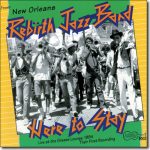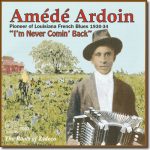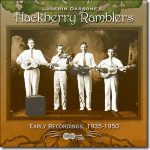Little Bill Gaither – Vol. 5: 1940 – 1941 / Document CD-5255
$13.00
In stock
Description
Document Records Compact Disc-CDDOC5255
1940 – 1941
>Tired of Your Trifling Ways
>Life of Leroy Carr
>Love Crying Blues
>Love Trifling Blues
>Georgia Barrel House
>Wandering Rosa Lee
>Money Kills Love
>It’s Just a Woman’s Way
>Short Cut to the Grave, A
>I’m Behind the 8 Ball Now
>Moonshine by the Keg
>Why Is My Baby So Nice to Me
>Uncle Sam Called the Roll
>I Got So Many Women
>I Can Drink Muddy Water
>You Done Ranked Yourself With Me
>1941 Blues
>Jealous Woman Blues
>That Will Never Do
>Please Baby
>It’s a Sad Story
>Old Rainy Day Blues
>Why Do You Tease Me So?
>Worried Life Blues
>Bad Luck Child’s Bequest
>Creole Queen
Personnel: Bill Gaither (vocals, accordion); Leonard Caston, Blind John Davis (piano).
In 1940, blues guitarist Bill Gaither left Indianapolis and took himself back to Louisville, KY where he opened a music shop called Donald Duck Records out of which he ran a radio and jukebox repair service. He also ceased recording for the Decca label (for which he’d waxed about 90 sides beginning in 1935), crossing over to Okeh along with his buddy Big Bill Broonzy. This is the best explanation for why long, lanky Gaither suddenly began identifying himself as Little Bill Gaither — out of deference to Big Bill. When he switched from Decca to Okeh, Gaither also stopped billing himself as Leroy’s Buddy, a reference to his friendship with blues piano legend Leroy Carr. With the exception of an errant alternate take of “Rocky Mountain Blues,” which appeared on the blues collection Too Late, Too Late, Vol.13, the fifth and final volume of Gaither’s complete works as reissued by Document during the ’90s, contains all of his remaining material, consisting of 26 recordings made for Okeh in the months immediately preceding the U.S. entry into WWII. The first eight titles were made on June 12, 1940 with pianist Joshua Altheimer and a string bassist whose name is now forgotten. In addition to several of his customarily bitchy tunes about soured interpersonal relationships (the most poignant example being “Money Kills Love”), Gaither tossed off a rocking boogie-woogie with boisterous lyrics entitled “Georgia Barrel House,” a reverent tribute to his late friend Leroy Carr, and “Wandering Rosa Lee,” a rare instance of Gaither expressing happiness in a love song. Rose Lee was a woman he’d met briefly in Louisville and had spent six years pining over and singing about. On January 24, 1941 Gaither cut another ten sides for Okeh, this time with pianist Leonard Caston (billed as Baby Doo) and another (or the same) unnamed bassist. Personnel listings for the last eight titles on this collection (which turned out to be Gaither’s final recordings) mention pianist Blind John Davis and posit Jesse Ellery as the guitarist rather than Gaither. Louisville historian Pen Bogert notes the influence of Peetie Wheatstraw on Gaither during “Moonshine by the Keg,” and the visceral immediacy inherent in his cover of Big Maceo’s “Worried Life Blues,” which was backed with a heartfelt tribute to New Orleans (and its hookers) in “Creole Queen.” These selections were the product of a session that took place on November 28, 1941 nine days before Japanese fighter planes attacked Pearl Harbor on the Hawaiian island of Oahu. Gaither received his conscription notice in 1942 and became a member of the African American 1st Battalion of the 24th Infantry Regiment, serving at first mainly as an electrician and radio repairman. When the racially segregated United States Army put Gaither’s combat-ready unit to work in Guadalcanal, it was as manual laborers who did nothing more complicated or heroic than unloading freight. They were sent to Bougainville in the Solomon Islands in January 1944, first as stevedores and then as the first all-black infantry patrol to see active service in WWII. Pinned behind enemy lines, Gaither’s unit battled their way through tropical undergrowth and across a river to relative safety. Soon afterwards, they were assigned to the island of Saipan where they engaged in the unenviable task of seeking out and apprehending Japanese soldiers who had yet to surrender. Although Gaither and the other survivors received the Combat Infantryman Badge, he came home completely transformed by his wartime experiences, encumbered by a nervous condition that caused him to abandon music altogether. His story ends ingloriously with a remarriage, a return to Indianapolis in 1948, and years of innocuous employment as a maintenance worker and cafeteria busboy. Gaither passed away in Indianapolis on October 27, 1970 and is buried in New Crown Cemetery not far from the graves of Yank Rachell, Wes Montgomery, Scrapper Blackwell, and Leroy Carr. ~ arwulf arwulf
Additional information
| Weight | 0.31 lbs |
|---|
You must be logged in to post a review.






Reviews
There are no reviews yet.